July 26, 2013
(Redacted)
Five years ago — five! — I was commissioned to write a piece for the Kappa Kappa Psi / Tau Beta Sigma 2013 National Intercollegiate Band. Yes, they gave me FIVE YEARS! And I was still late. Originally due in January 2013, I finally delivered the piece in May. Not the end of the world, since this was for an honor band, and they wouldn’t start rehearsing until two days before the concert in July, but still… late.
Every commission has a challenge, and that’s generally what inspires the material. With this commission, the biggest challenge was the difficulty level. The players are all current (or very recent) college students, and they’re music majors, and as individuals, they’re excellent players, so I needed to give them some meat. I didn’t want them to be bored with their parts. (I never do. There’s nothing worse – as a listener or a performer – than music that causes boredom.) At the same time, though, this was an honor band. They started rehearsing Sunday night, then rehearsed several hours Monday, then Tuesday, and then the concert was Tuesday night. That’s basically two days of rehearsal for an ensemble that has never played together as a group, with every section consisting of players from all over the country. It’s basically an All-State band, but with college students instead of high school students – and national, instead of state-based. So the piece needed interesting individual parts, but without quite as many ensemble-specific challenges as I might normally (unintentionally) put into a piece.
On top of this, the concert would be conducted by a conductor with whom I’d never collaborated — Anthony Maiello from George Mason University. So I was writing a piece for an ensemble that would not even exist until two days before the concert, to be conducted by a tremendously respected conductor, but one I didn’t know well personally.
What’s this Maiello character like?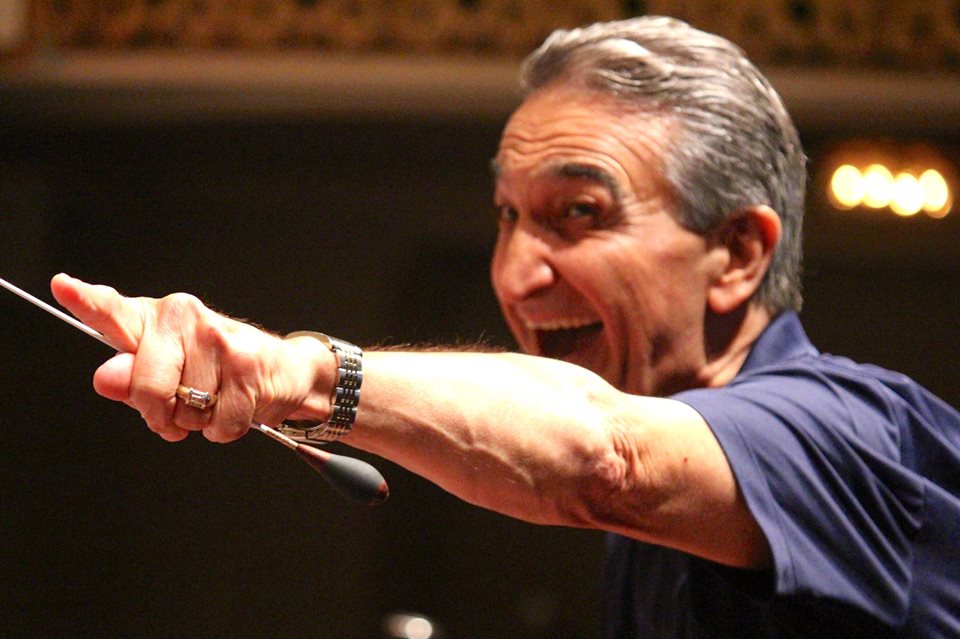
That’s an actual shot from rehearsal. And that exactly captures Anthony Maiello. It is impossible not to love him. (All photos, by the way, are courtesy of Travis Cross.)
Tony and I had exchanged several emails about the piece, clearing up questions he had, but we hadn’t spoken in person until a few minutes before the first rehearsal on Sunday night.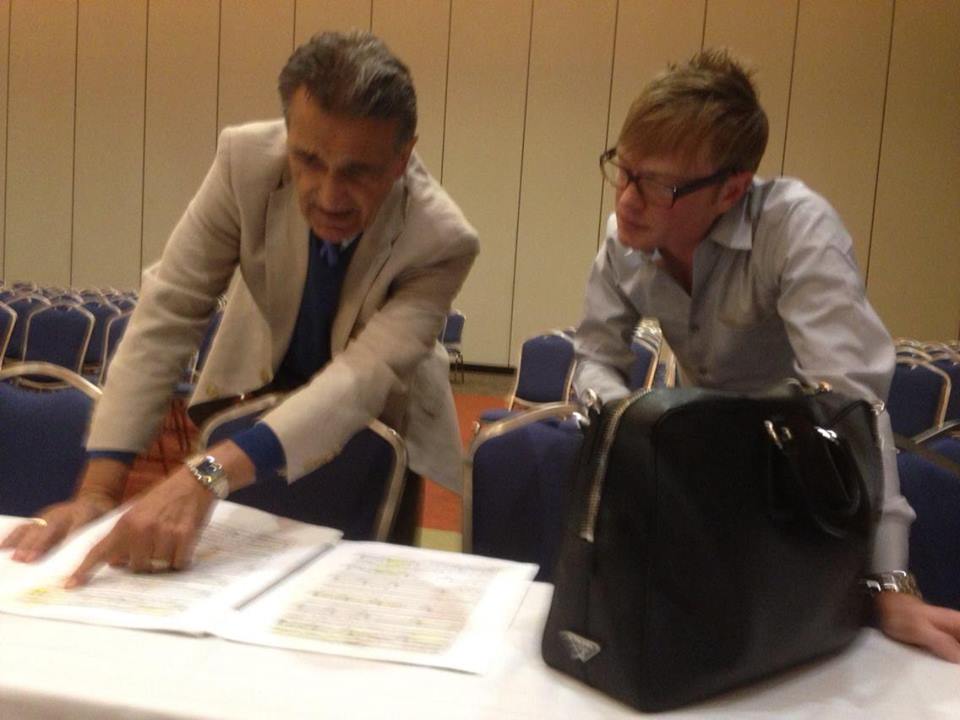
Tony had clearly spent dozens of hours studying the piece. This was going to be just fine.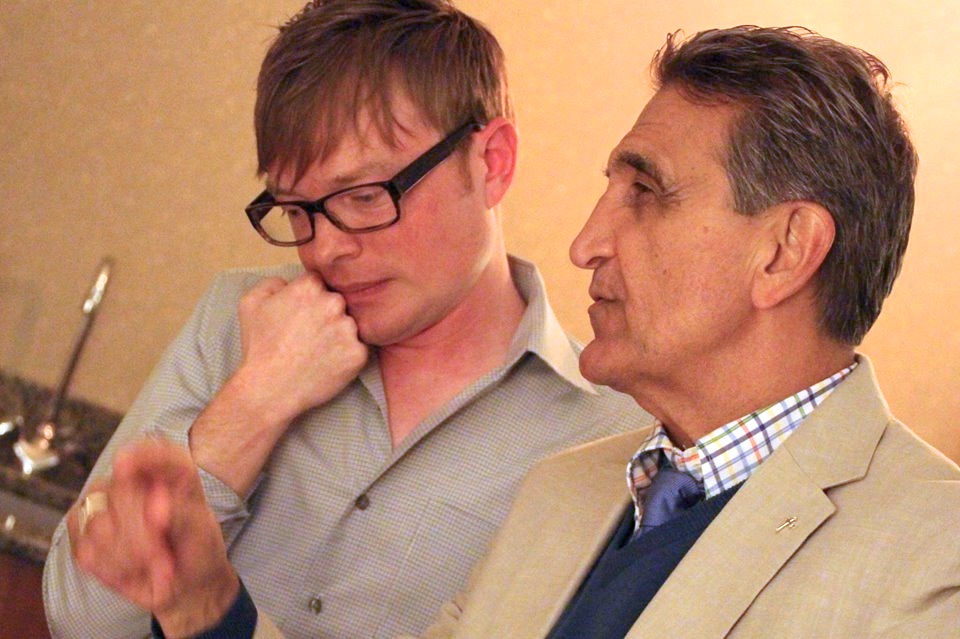
I hadn’t made him a MIDI, although I usually would with a new piece. This piece has so many solos and so much rubato that the MIDI sounded mechanical and terrible. I thought in this rare case, the MIDI would do more harm than good, provided I was working with a musically sensitive conductor. Boy howdy, I sure was.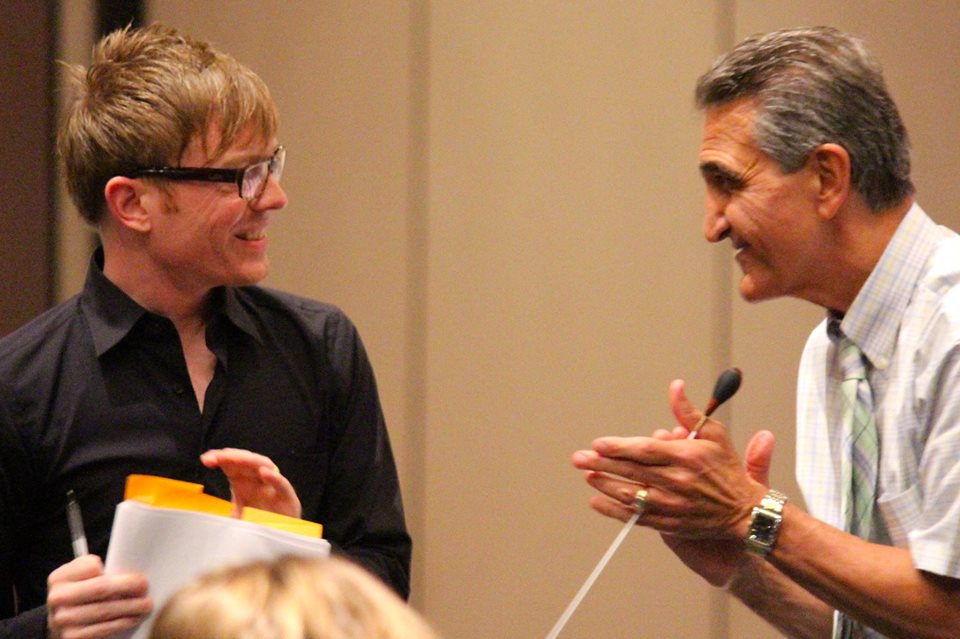
The first reading rehearsal was Sunday night. I skipped it. Composers: Do not EVER go to the first rehearsal of your piece, especially in the case of a world premiere, but even if it’s been played dozens of times — you DO NOT WANT TO HEAR THE FIRST REHEARSAL, and THE PLAYERS DO NOT WANT YOU THERE. You’ll only cause yourself actual pain. Hearing your piece played in any way other than what you imagined is physically painful. It hurts. So do yourself, and the players, a favor, and wait until at least the second rehearsal before attending.
The piece is called (Redacted). To quote Jake Wallace’s program note:
When a classified document must be revealed to the public, it is redacted: Sensitive passages of the text are blacked out, to preserve the secrets within. So revelation just leads to more questions, and what is exposed is only that the truth remains hidden. Writ large, this is the essence of clandestine work—its task is both to keep and to uncover secrets. This dual nature, and its inherent conflict, provides the basis for John Mackey’s (Redacted), a piece that offers hints of covert action and intrigue while holding the full story just out of reach.
I showed up at rehearsal on Monday morning. I loved working with Tony, and also with this group.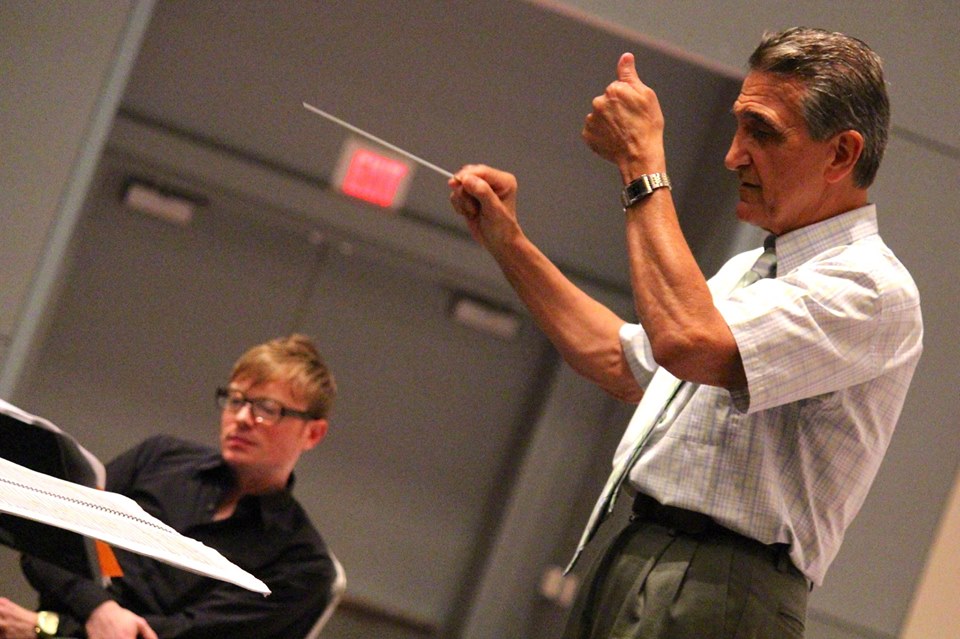
Here, I describe to the ensemble’s bass trombonist, Sean DeLong, what I consider to be “ideal bass trombone tone.”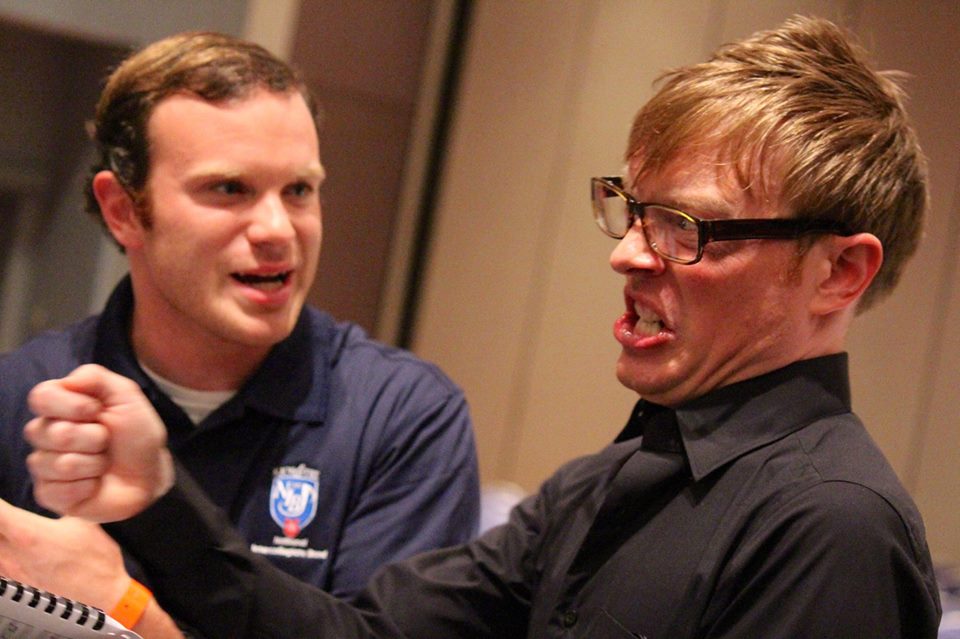
WTF??? It that a tiny double bass? Oh. WTF is a cello doing in the band?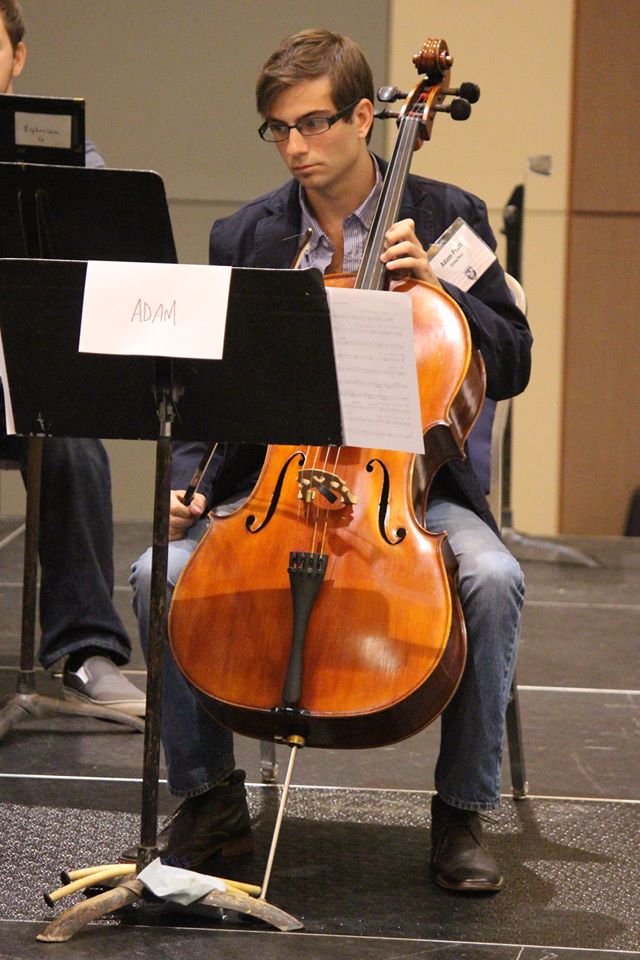
That’s Adam Pratt from Texas Wesleyan University. One of the pieces on this program called for cello, so there he was, playing euphonium parts on the other pieces, as is tradition with the US Air Force Band. During rehearsal, I looked over at him and thought it might be nice to take advantage of the fact that THERE’S A DAMN CELLO IN THE BAND. So, I took two measures of what is scored for solo clarinet, and I made it a cello solo. Thank you to Adam for being so accommodating. (The score, by the way, still has that part for clarinets, but I think I’m going to make an official optional cello part just because it was so effective. You’ll see when you listen. You’re going to listen to the piece, right?)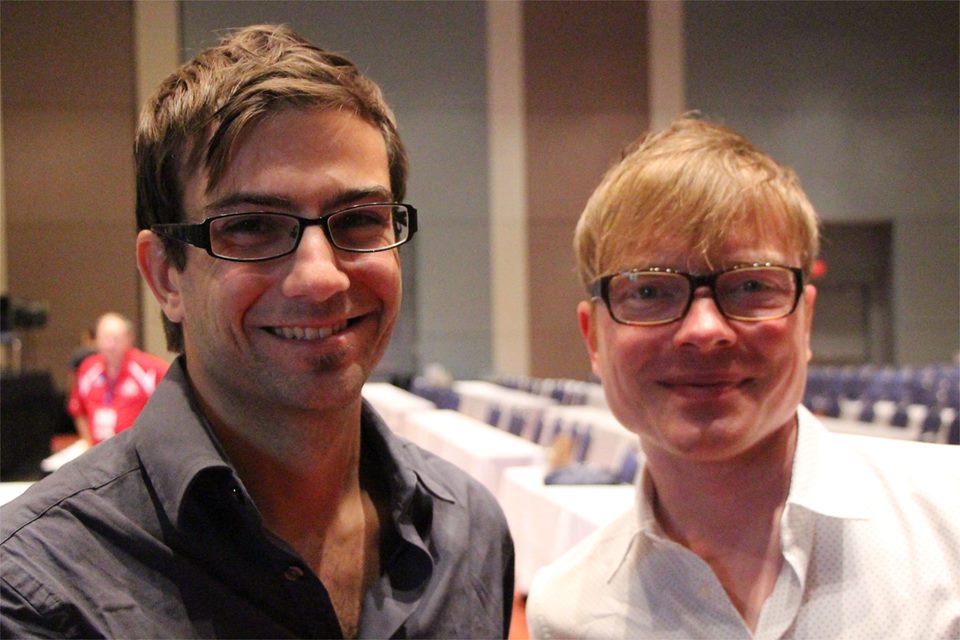
The premiere on Tuesday night was sort of astonishing, particularly when you realize that this piece had never been played before, so none of the players had heard a recording or anything, and they did this in 48 hours. You can view the full score via the page for (Redacted), and you can listen to the world premiere recording either via that page, or by just clicking the Soundcloud link below.
Thank you to Kappa Kappa Psi and Tau Beta Sigma for commissioning the piece, and thank you to Tony and the National Intercollegiate Band for playing the bejesus out of it.
June 1, 2013
The Soul Has Many Motions
If you’re a music educator, particularly in the state of Texas, you probably know who Richard Floyd is. He’s been a conductor and music educator for 50 years. He was Director of Bands at Baylor for nine years. He’s given hundreds if not thousands of clinics all over the world. He’s a member of the American Bandmasters Association’s Board of Directors (through which he commissioned the band version of my piece, “Strange Humors“). He’s been the Texas Bandmasters Association Bandmaster of the Year. His “day job” is — or was — State Director of Music at the University of Texas at Austin (UIL), where he (to put it as simply as possible) ran the state’s massive solo and ensemble (3500 performing organizations!) contest system. And it’s that job from which he’s retiring this spring. High school bands in Texas are legendary, and it’s in no small part due to the influence of Richard Floyd. He’s also a very kind man. Everybody loves Richard Floyd. In honor of his retirement from UIL, UT asked me to write a piece for him.
Scott Hanna, one of the UT conductors, first contacted me about the project in August 2010 — nearly three years ago. The meeting went something like this:
Scott: We’d like to commission you to write a piece for Dick Floyd’s retirement. We’ll surprise him with the piece at a concert in his honor.
Me: Absolutely, no question, I would love to do this. I owe so much to Dick Floyd. When is he retiring?
Scott: He hasn’t announced his retirement yet, so we just need the piece in time to premiere it as soon as he announces his retirement. But you have to keep it secret until the concert.
Me: Consider it done.
If you’ve ever met Dick Floyd, you’d have a hard time imagining him “retiring.” In fact, I was convinced he’d never retire. This commission was the greatest gig ever! I’d take the money but never have to actually write the piece! $CORE!
And as I expected, two years passed and no retirement! And then, last September, I got an email from Scott Hanna. To my shock, Dick announced that he was retiring at the end of the school year. That meant that I now had to write that 15-minute piece that I never expected to write. And it was for Dick Floyd, so it had to be… good.
One of the coolest things about this commission was that it had to remain a surprise. Dick couldn’t know about it until he showed up at the concert where the piece would premiere. That meant that I had to resist posting on Facebook or Twitter or here on the blog anything about the writing process. Do you know how much self control it required for me to not post about this online?! Me – the person who posts pictures of things as minor as “hey, look, I got a new cocktail recipe book.”
Or “here’s a box of toilet paper that I ordered from Amazon because I’m too lazy to go to the store.”
Avoiding a web presence is not exactly “my thing.” I flew to Austin to work with the UT Wind Symphony a few days prior to the premiere, but Dick couldn’t know I was there. This became problematic when he showed up at the UT music building minutes before the dress rehearsal.
“Dick Floyd is in the building! He’s roaming the halls! Hide!” And hide I did. I literally hid in a stairwell to avoid being spotted by him. I managed to sneak into the concert hall for the dress rehearsal, avoiding being spotted — until he came into the concert hall.
Dick Floyd: John Mackey? I had no idea you’d be in town! What are you doing here?
Me: Um, the band… the band is doing “Strange Humors.” And I had a clinic at Georgetown High School. (This was true.)
Dick Floyd: Well it’s great to see you!
Me: Um, yeah… You too!
Dick Floyd: I understand you have a new piece on the program? Tell me about it!
Me: Oh, it’s… it’s just a little thing. You’ll, uh, hear it tonight. Gotta go.
(and with that, I walked away, essentially giving the brush-off to one of the most powerful people in music in Texas)
So the band rehearses “Strange Humors,” and then starts rehearsing Persichetti’s Symphony #6, and my new piece — Dick Floyd’s new piece — which is supposed to be a surprise! — is coming up next, and Dick Floyd is still in the hall. He couldn’t be in there for the dress rehearsal! There was panic amongst the people who knew about the surprise, but nobody knew what to do. How the hell could we get him out of the hall? Should I pull the fire alarm? Shoot him with a tranquilizer dart? I had a less radical idea.
Me, to Dick Floyd: So, they’re about to rehearse my new piece. To tell you the “truth,” the rehearsals this week have been shaky at best. It’s been pretty rough. I’d really rather you not hear the piece until the official premiere tonight. I don’t mean to sound rude, but I’d appreciate it if you’d go get a drink or something, and wait until tonight to hear the piece. That’ll give me more time to clean things up before you hear it for the first time.
Dick Floyd: No problem. Have a good dress rehearsal. I’ll see you tonight.
And he left. Crisis averted.
About the piece, via an aside: I hate when people call pieces of lyric-less music a “song.” “I really like your song, The Frozen Cathedral.” No. I mean, thank you (really! you’re very sweet!), but no. To be snotty for just a moment, pieces without lyrics are called “pieces,” not songs. You could say to Mahler, “hey, I really like your Kindertotenlieder songs! Those are BAD ASS.” That would be fine. They have lyrics. And Mahler would probably love to hear that you liked his songs for the death of children. (“Thanks, kid!” he might say.) But don’t tell him “I liked your fifth symphony song.”
In the case of this new piece, though, I really was thinking of songlike movements, not unlike Mendelssohn’s “Songs Without Words.” Simple structures with singable tunes. In my mind, they’re wordless songs.
The decision was made to conceive of the suite almost like a Texas high school’s full contest program. The suite starts with a fanfare, then moves on to a percussion feature, then the lyrical piece, and closes with a wild circus march. As always, my wife AEJ titled the piece and the movements:
THE SOUL HAS MANY MOTIONS
I. Violet Crown Fanfare
II. Night on Fire
III. Unquiet Spirits
IV. The Ringmaster’s March
Here’s what she wrote describing the movements:
In physics a motion is a change; in geometry a motion is a transformation. These four songs, written on the occasion of Richard Floyd’s retirement, celebrate that moment of change and transformation by evoking many kinds of motion, of bodies and of the soul. “Violet Crown Fanfare” captures the movement of the heavens and the optimism of the wide-open West; “Night on Fire” suggests the wild dancing of a nomadic camp; “Unquiet Spirits” is a waltz full of longing and an otherworldly sweetness. The final movement, “The Ringmaster’s March,” is a riotous Ivesian circus parade, a joyful noise in honor of a man who has always been at the center of the show.
The piece premiered on May 3 on a concert entitled “A Tribute to Richard Floyd.” Scott Hanna wrote in the program:
The Soul Has Many Motions is our gift to Mr. Floyd. Fittingly, the piece was commissioned by and funded entirely by students – in this case, a group of six student organizations at The University of Texas Butler School of Music with whom he has worked to produce the annual Texas State Solo and Ensemble contest. This event touches the lives of thousands of Texas high school musicians each year, and is a living testament to the incredible reach of Mr. Floyd’s work.
The full suite is about 14 minutes long. Each movement was written to stand on its own, so groups can perform one or more of the movements on a concert, splitting them up, changing the movement order – whatever. One movement, “Night on Fire” (the least technically demanding of the four) is available as a standalone piece, but the other movements are available only with the complete suite.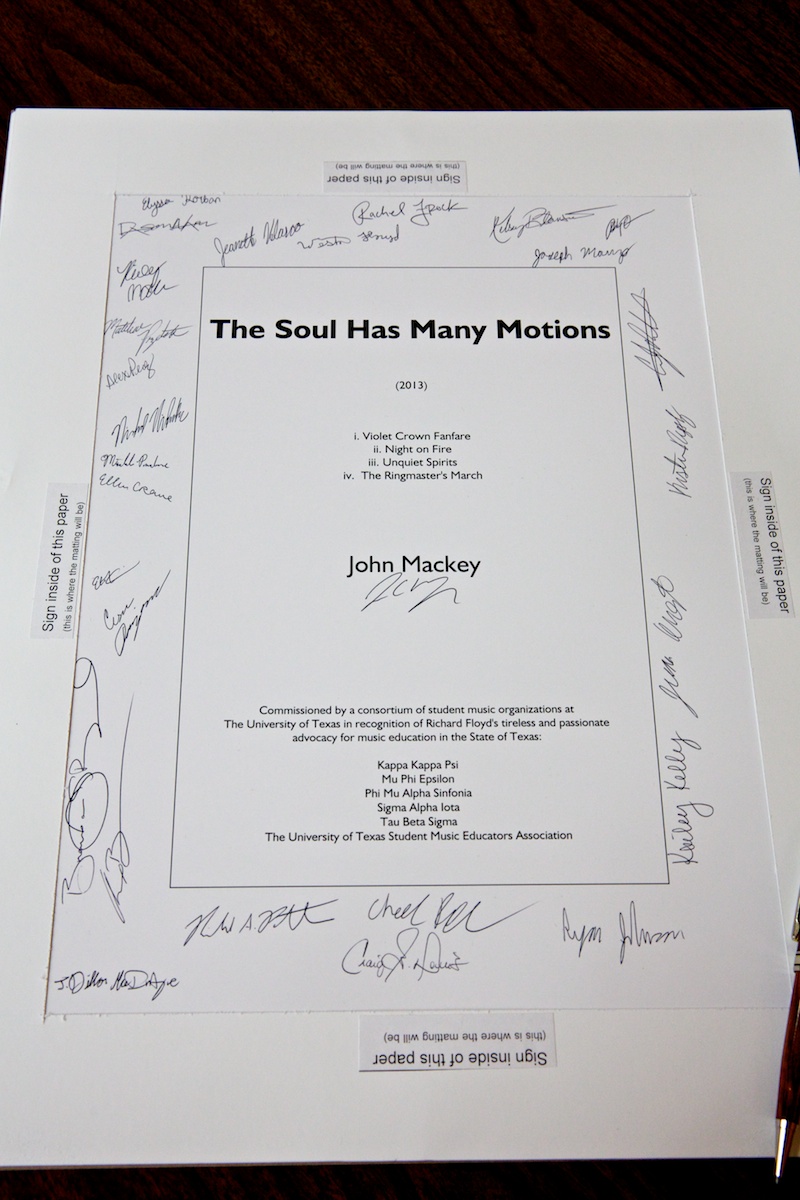
You can see the full score and listen to recordings (MIDI demos of three movements, real recording of “Night on Fire”) via this link.
Thank you to Richard Floyd for all he has done for music education not just in Texas, but throughout the United States. And for the record, I was sort of correct: yes, he left his job at UIL, but he is nowhere near full-on spend-all-day-at-the-beach retirement. Like I said, that guy is never going to retire.
View Comments
Comments
You're a good man, John Mackey, and this is a lovely gift you've given Dick Floyd. (And I haven't even listened to it, yet.) Hope to hear a full recording soon.
Add comment
May 31, 2013
Sax Concerto piano reduction
I wrote my soprano sax concerto back in 2007, and at least once a month since then, a sax player has emailed me to ask when they could expect to see a piano reduction. For several years, my response was along the lines of, “wow, I wish there were a reduction, but I don’t see how that could ever happen. You’d need eight hands.” How can one possibly reduce 45 individual parts down to two hands and maintain any resemblance to the original?
I eventually made a reduction of movement 4, “Wood,” since that reduction was pretty doable. I’ve been selling that movement as a standalone sax/piano duet called “Sultana.” I also made a reduction of movement 3, “Metal,” which I think works fine as well, but when it got to movements 1, 2, and 5, I was stumped. Until, out of nowhere, I got an email from somebody named Liz Ames.
Liz, at the time, was a doctoral collaborative piano student at Arizona State and she specialized in — this is true! — saxophone music. You read that right. She’s a pianist who just loves accompanying sax players. She worked regularly with Tim McAllister, then the sax professor at ASU (now at Northwestern), and Tim introduced Liz to my concerto. (You can hear Tim’s recording of my concerto here on the site, as it’s the reference recording for the piece.)
Liz emailed me to say that she wanted to work on a reduction for my concerto. She wrote:
The reason why I am so interested in reductions is because there are so many reductions which do not uphold the integrity of the music nor are they accessible to even the best pianists. This, of course, leads to fewer performances of these pieces or no performances at all since it is already so difficult for saxophonists to find a pianist. I love working with saxophonists and I love the music that they play and only wish to expand the repertoire that they have to choose from.
Thanks to Liz, there is now a playable (!), effective (!!!) reduction of my previously un-reducable sax concerto. I’ve heard Liz play it, so I can confirm that although it is insanely virtuosic, it is possible to play. But be warned: the piano part is as difficult as the solo sax part.
The reduction is available from me directly. Visit the ordering page and scroll down to the chamber music category. And start hunting for a great pianist (or just hire Liz Ames – who is now based in Chicago).
View Comments
Comments
Jenifer says
I just instinctively made that face when I heard the bass trombones.
Box 5 all around!
Deb Eakins, KKPsi says
What a fun piece. So sorry I missed the premier.
Thanks for giving our students such a wonderful experience as performers and as audience members.
Heather, NIB Participant says
Thanks for sharing!!!
Sean says
Excellent piece - I particularly like the cello solo and the moments of more enigmatic harmonies. The orchestration (and key) at rehearsal D reminds me of the beginning of Vaughan Williams's 9th symphony (another enigmatic work); I don't know if that was an influence.
Kimbi Sigle says
Thank you for posting this! I have been waiting five years to enjoy this piece and you certainly delivered! The students loved it and the audience was amazed! Thanks for working with us!!
Kimbi Sigle, Past National President
Tau Beta Sigma 2007-2009
(Redacted) See What I Did There? says
Thank you for writing this wonderful work for our organizations, and for the band repertoire in general. It is a great addition to the history of the NIB. Thank you!
Chuck McLaughlin says
My daughter Erin was one of the percussionists. Thank you for enabling us parents to download it so we could hear our children perform this remarkable piece! The only suggestion I would humbly submit is: MORE COWBELL!
Adam Cantley says
John,
Thank you so much for your work with Kappa Kappa Psi, Tau Beta Sigma, and the National Intercollegiate Band. It was an amazing experience for all those involved. I will be a "John Mackey Fan Boy" for life! You, Prof. Maiello, and the NIB set the tone for a fantastic week for us.
Adam D. Cantley
Kappa Kappa Psi
Immediate Past National President
Kenneth T. Northcutt Jr. says
Thanks Mr. Mackey! This was one of the most wonderful pieces I have ever played. It was so unconventional and atonal and the dynamics kept you on your toes like a movie soundtrack. I see this being in a movie soundtrack or possibly a ritual. This NIB was an experience of a lifetime and felt honored to be in the presence of an awesome composer! Hopefully you will come out with a solo clarinet and wind ensemble in the near future!!!
Add comment